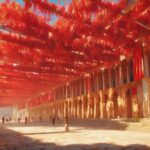Welcome to the captivating world of Albania, where history, geography, and culture merge to unveil a treasure trove of unique wonders. From its rich historical legacy to its breathtaking landscapes and intriguing traditions, Albania is a country that will mesmerize and delight. In this article, we invite you to embark on a journey of discovery as we unmask the fun facts that make Albania truly one-of-a-kind. Prepare yourself for a delightful exploration of Unearthing Albania’s Unique Wonders: Fun Facts Galore!

Key Takeaways:
- People in southern Albania consider frog legs a delicacy.
- There are more Albanians living outside of Albania than within the country.
- It is believed to bring good luck in Albania if a baby pees on you.
- The locals in Albania have an official evening walk called xhiro for socializing and relaxation.
- In Albania, shaking the head means agreement, while nodding means disagreement.
- Mother Teresa, born in Skopje, is considered the heroine of Albania.
- Albania was the world’s first atheist state, banning all religions in 1967.
- Albania has numerous unused military bunkers built during the communist regime as defense against invasion.
Fun Facts About Albania
Albania, a hidden gem nestled in the Balkan Peninsula, offers a treasure trove of unique wonders waiting to be unearthed. From its intriguing cultural customs to its fascinating history, this enchanting country is sure to captivate your imagination. So, join me on a delightful journey as we explore some fun facts about Albania that will leave you yearning for more!
A Culinary Delight: Frog Legs
In the southern part of Albania, locals have developed a taste for a rather unusual delicacy – frog legs. Considered a culinary delight, these succulent amphibian limbs are savored for their unique flavor and tender texture. So, if you’re feeling a bit adventurous, why not give this delicacy a try during your Albanian escapade?
A Global Albanian Community
Did you know that there are more Albanians living outside of Albania than within the country itself? With approximately 7-10 million Albanians residing in countries such as Kosovo, Macedonia, Montenegro, Greece, Turkey, Italy, Germany, Switzerland, Sweden, and the United States, the global Albanian community is thriving. These diaspora communities play an essential role in upholding Albanian culture, keeping traditions alive across borders.
A Peculiar Source of Good Luck
In Albania, good luck can come from the most unexpected sources. It is believed that if a baby pees on you, it brings forth a stroke of good fortune. While this may sound bizarre to some, this peculiar Albanian belief showcases their unique perspective on what brings about positivity in life. So, if you find yourself in the company of a smiling baby, don’t be too quick to dodge their tiny bladder!
Embracing the Tradition of Xhiro
In Albania, community and social connections are highly valued, and one way this is expressed is through the tradition of xhiro. This official evening walk offers locals the opportunity to unwind, socialize, and immerse themselves in the vibrant energy of their neighborhoods. As you stroll alongside cheerful locals during a xhiro, you’ll witness the rich tapestry of Albanian culture unfold before your eyes.
Head Shake, Nod, and the Art of Communication
When engaging in a conversation with Albanians, prepare to have your body language assumptions turned upside down. In Albania, an affirmative response is indicated by a shake of the head, while a disagreeing stance is conveyed through a nod. This unconventional communication style may initially seem perplexing, but it serves as a testament to the nuances of cultural practices that make Albania all the more intriguing.
The Heroine of Albania: Mother Teresa
Born in Skopje (now the capital of North Macedonia), Mother Teresa is widely regarded as the heroine of Albania. Esteemed for her tireless dedication to helping the poor and marginalized, Mother Teresa’s Albanian roots serve as a point of great pride for the country. Her profound impact on the world reflects Albania’s unwavering commitment to charitable acts and elevating the human spirit.
A Unique Historical Legacy: Atheism and Bunkers
Albania holds a remarkable historical distinction as the world’s first atheist state. In 1967, the country embarked on a bold endeavor, completely banning all religions. This unprecedented move shaped Albania’s identity and created a society free from religious influences.
As you traverse through Albania’s picturesque landscapes, another peculiar feature may catch your eye: tens of thousands of unused military bunkers. These sturdy fortifications, built by the communist regime during the mid-20th century, were intended to defend against foreign invasion. Today, they stand as silent witnesses to a bygone era, dotting the landscape and offering glimpses into Albania’s tumultuous past.
Albania, with its rich tapestry of customs, cultural practices, and incredible history, is a destination that promises to delight and surprise even the most seasoned of travelers. From savoring the flavors of frog legs to navigating the head-shaking communication style, you’ll find endless opportunities for discovery and enchantment within this extraordinary country. So, pack your bags, and let Albania’s unique wonders unravel before your eyes!
Here are some fun facts about different countries that you might find interesting:
- Fun Fact About Sweden: Did you know that Sweden has the highest number of McDonald’s restaurants per capita in Europe? Explore more fascinating facts about Sweden.
- Fun Facts of Nepal: Nepal is home to the highest peak in the world, Mount Everest. Discover more intriguing facts about Nepal and its rich culture.
- Fun Fact About Sri Lanka: Sri Lanka is renowned for its diverse wildlife, including the world’s largest concentration of leopards. Uncover more captivating facts about Sri Lanka.
- Fun Facts About Armenia: Armenia is one of the world’s oldest wine-producing countries, with a tradition dating back over 6,000 years. Learn more intriguing facts about Armenia and its fascinating history.
- Something Interesting About Honduras: Did you know that Honduras is home to the second-largest barrier reef in the world? Discover more captivating facts about Honduras and its natural wonders.
Explore these links to learn more about each country’s unique and fascinating facts!
The Tradition of Sworn Virgins in Albania: A Unique Cultural Phenomenon
Origins of the Tradition
- The tradition of sworn virgins in Albania originated from the Kanun, a set of codes and laws developed by Lekë Dukagjini and used in northern Albania and Kosovo from the Ottoman era until the 20th century[^1].
- The Kanun is not a religious document and is followed by various religious groups, including Albanian Orthodox, Catholics, and Muslims[^1].
- The tradition developed in strict patriarchal families and rural regions of Albania, Kosovo, and Montenegro[^2].
The Role of Sworn Virgins
- Sworn virgins take on male privileges, such as making family decisions, smoking, drinking, and going out alone, while remaining celibate[^3].
- They are seen as the heads of their households and are often responsible for providing for their families[^3].
- The practice allowed women to escape the limitations placed on them by traditional gender roles[^3].
Decline of the Tradition
- With increased freedom and opportunities for women, fewer women today choose to become sworn virgins[^3].
- The tradition is on the decline, with only a dozen sworn virgins remaining worldwide[^4].
- Young women in Albania are actively rejecting the tradition and fighting for equal rights and gender equality[^4].
Impact of Socio-political Changes
- The Socialist People’s Republic of Albania brought changes that affected women’s rights, leading to a shift away from the practice of sworn virgins[^1].
- Women in central and southern regions of Albania gained legal rights and social status, while patriarchal traditions remained stronger in the northern region[^1].
Cultural Significance
- The tradition of sworn virgins in Albania has attracted significant interest and has been covered by various media outlets[^4].
- The practice has been the subject of documentaries and articles, shedding light on the complex dynamics of gender and identity[^4].
Key Takeaways:
- The tradition of sworn virgins in Albania originated from the Kanun, a set of codes and laws used in northern Albania and Kosovo[^1].
- Sworn virgins take on male privileges and responsibilities while remaining celibate[^3].
- The tradition is on the decline, with only a few sworn virgins remaining worldwide[^4].
- Women in the central and southern regions of Albania have gained more rights and social status, leading to a shift away from the practice of sworn virgins[^1].
- The tradition of sworn virgins in Albania has attracted significant media attention and has been the subject of documentaries and articles[^4].
Sources:
[^1]: The New York Times – With More Freedom, Young Women in Albania Shun Tradition of ‘Sworn Virgins’
[^2]: The Collector – The Sworn Virgins of Albania
[^3]: The New York Times – The Sworn Virgins of Albania
[^4]: BBC News – The last of the sworn virgins
Unearthing Albania’s Unique Wonders: Fun Facts Galore!
Albania is famous for its colorful bunkers, remnants of its communist past.
Have you ever wondered about the intriguing landmarks and historical artifacts that make Albania a truly unique destination? Well, let me take you on a captivating journey through the intriguing world of Albania’s colorful bunkers – remnants of its communist past!
Albania’s Concrete Time Capsules: A Fascinating Relic of History
When strolling through Albania’s picturesque landscapes, you can’t help but notice an abundance of concrete bunkers dotting the countryside. These unique structures hold a historical significance that reflects the country’s tumultuous past.
During the rule of the Hoxhaist government led by Enver Hoxha from the 1960s to the 1980s, a remarkable bunkerization program was initiated. Its primary objective was to fortify Albania against potential attacks, leading to the construction of over 750,000 bunkers – an astonishing average of 5.7 bunkers per square kilometer. Ranging in size from small pillboxes to expansive underground installations, these bunkers are a visual reminder of Albania’s commitment to defending its borders.
A Drain on the Economy: The Cost of Bunkerization
While the bunkerization program aimed to enhance Albania’s defense capabilities, it came at a significant cost. The immense resources required for bunker construction diverted valuable funds from other pressing needs, such as housing and infrastructure. This strain on the country’s weak economy serves as a testament to the radical nature of Hoxha’s political regime.
Despite the extensive efforts and economic sacrifices, these bunkers never fulfilled their intended purpose during Hoxha’s rule. Instead, they remained silent witnesses to an era of political isolation and ideological tension.
From Ruin to Repurposing: The Fate of Albania’s Bunkers
Following the fall of the communist regime in 1992, Albania underwent a dramatic transformation. The once highly guarded bunkers were abandoned, left behind as reminders of a bygone era. However, despite their obsolete nature, some bunkers found new life through creative repurposing initiatives.
Today, you can stumble upon bunkers that have been transformed into a range of unconventional uses, including residential accommodations, cafés, storehouses, and even shelters for animals or the homeless. These adaptive reuse projects not only breathe new life into these structures but also provide unique experiences for locals and visitors alike.
Beyond Albania’s Bunkerized Boundaries
Albania’s bunkerization program was not the only aspect of Hoxha’s rule that set the country apart on the global stage. Enver Hoxha pursued a hardline Stalinist and Maoist political style, leading Albania to break ties with both the Soviet Union and China due to ideological and geopolitical differences.
Additionally, Hoxha’s government championed a hostile relationship with neighboring countries, even maintaining a state of war with Greece until 1987. This pursuit of isolation and preparedness for potential conflicts led to Hoxha’s vision of Albania fighting a two-front war against Yugoslavia, NATO, or the Warsaw Pact.
In the end, Albania’s colorful bunkers, remnants of its communist past, stand as a testimony to a unique chapter in the country’s history.
Key Takeaways:
- The bunkerization program during Enver Hoxha’s rule led to the construction of over 750,000 bunkers in Albania at an astonishing average of 5.7 bunkers per square kilometer.
- The program aimed to fortify Albania against potential attacks but diverted resources from other pressing needs, such as housing and infrastructure.
- Despite their construction, the bunkers were never used for their intended purpose during Hoxha’s rule.
- After the fall of the communist regime, many bunkers were abandoned, while others found new purpose through repurposing initiatives.
- Albania’s bunkerization program was just one aspect of Enver Hoxha’s strict Stalinist and Maoist political style, which also led to the country breaking ties with the Soviet Union and China.
Sources:
– Wikipedia: Bunkers in Albania
– WorldAtlas: Bunkers in Albania
The Albanian language: A Living Testament to Europe’s Linguistic Legacy
The Albanian language is not just a means of communication; it is a historical treasure that connects us to Europe’s linguistic past. As one of the oldest spoken languages in Europe, its longevity is a testament to its enduring importance. So, let’s delve into the intriguing journey of the Albanian language and discover why it holds such a special place in the hearts of linguists and culture enthusiasts alike.
Uncovering Its Ancient Roots
The origins of the Albanian language can be traced back to the 2nd century BC, making it one of the oldest surviving members of the Indo-European language family. This linguistic lineage gives it a unique place of distinction among European languages. Imagine being able to speak a language that holds echoes of words spoken by our distant ancestors!
To dig even deeper into its roots, Albanian is believed to be the descendant of a Paleo-Balkan language. This ancient connection gives it a rich historical context, making it a linguistic bridge between the past and the present.
Spoken Through the Centuries
Throughout history, the Albanian language has weathered many storms and remained resilient, serving as a source of cultural pride and identity for millions of people. Today, it is the official language of Albania and Kosovo, and a co-official language in North Macedonia and Montenegro.
A Language with Global Reach
But the reach of the Albanian language extends far beyond the borders of these countries. It is also recognized as a minority language in Italy, Croatia, Romania, and Serbia. Additionally, the Albanian diaspora, scattered across the Americas, Europe, and Oceania, ensures that the language maintains its global relevance.
Preserving an Ancient Heritage
With approximately 6.1 to 7.5 million speakers, the Albanian language may not be widely spoken compared to other European languages, but it remains a vital link to our linguistic past. Its ancient heritage has attracted the attention of linguists and scholars from around the world, who continue to study and preserve its unique features.
The Disputed Origins and Enduring Significance
Interestingly, the name “Albanian” and the current official name “Shqip” still carry traces of historical debates. The origins of these names are disputed, adding even more intrigue to the language’s already captivating story. However, despite the dispute, there is a consensus among linguists and scholars that the Albanian language stands as one of the oldest surviving members of the “Balkan” and Paleo-Balkan languages.
A Proud Survivor and Connection to the Past
In conclusion, the Albanian language is not just a vehicle for communication; it is a living testament to Europe’s linguistic legacy. Its ancient roots, spanning centuries of history, make it a treasure worth cherishing. As we continue to unravel its mysteries and dig deeper into its linguistic wonders, let us remember the importance of preserving and celebrating this remarkable language. By doing so, we honor not only the past but also those who keep the Albanian language alive and thriving.
Key Takeaways:
– The Albanian language is one of the oldest spoken languages in Europe, dating back to the 2nd century BC.
– With roots in a Paleo-Balkan language, Albanian serves as a linguistic bridge between the past and the present.
– It is the official language of Albania and Kosovo, and a co-official language in North Macedonia and Montenegro.
– The Albanian language is recognized as a minority language in Italy, Croatia, Romania, and Serbia.
– The Albanian diaspora ensures that the language is spoken and celebrated across the Americas, Europe, and Oceania.
– The name “Albanian” and the current official name “Shqip” have disputed origins, adding intrigue to the language’s history.
– The Albanian language is of great interest to linguists as it is the only surviving member of its branch of the extinct Illyrian tongue.
Sources:
– euronews.al
– Encyclopedia Britannica

FAQ
Q1: How did the tradition of sworn virgins in Albania originate?
A1: The tradition of sworn virgins in Albania originated from the Kanun, a set of codes and laws used in northern Albania and Kosovo from the Ottoman era until the 20th century. It developed in strict patriarchal families and rural regions of Albania, Kosovo, and Montenegro.
Q2: What role do sworn virgins play in Albanian society?
A2: Sworn virgins in Albania take on male privileges and responsibilities, such as making family decisions, smoking, drinking, and going out alone, while remaining celibate. They are seen as the heads of their households and often provide for their families.
Q3: Is the tradition of sworn virgins still practiced in Albania today?
A3: The tradition of sworn virgins is on the decline, with fewer women choosing this path due to increased freedom and opportunities. Only a dozen sworn virgins remain worldwide, as young women in Albania actively reject the tradition and fight for equal rights and gender equality.
Q4: How did socio-political changes impact the tradition of sworn virgins in Albania?
A4: The Socialist People’s Republic of Albania brought changes that affected women’s rights, leading to a shift away from the practice of sworn virgins. Women in central and southern regions gained legal rights and social status, while patriarchal traditions remained stronger in the northern region.
Q5: Why has the tradition of sworn virgins in Albania attracted significant interest?
A5: The tradition of sworn virgins in Albania has attracted significant interest because of its uniqueness and cultural significance. It has been covered by various media outlets and has been the subject of documentaries and articles, shedding light on the complex dynamics of gender and identity.
- Unveiling the Enigma: Mansoureh Khojasteh Bagherzadeh’s Public Appearances & Private Life in Iran - July 18, 2025
- Unveiling the Mystery: Mansoureh Khojasteh Bagherzadeh’s Husband: A Rare Glimpse into a Private Life - July 18, 2025
- Unveiling Masoud Khamenei’s Mother: Power, Influence, and Iran’s Future - July 18, 2025
















